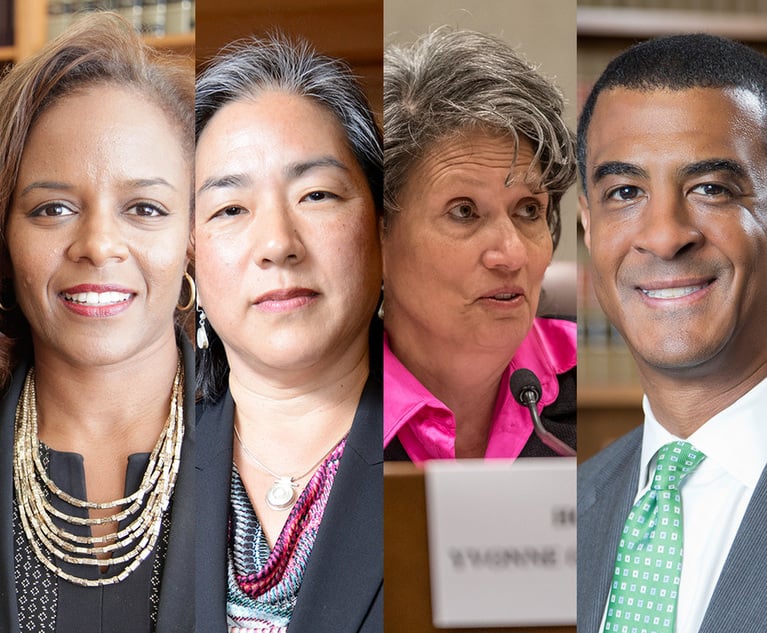Bench Report: Post-Pandemic Lessons From the Bench + Courthouse Accessibility
The judiciary was forced to undergo changes during the pandemic to keep its doors open, and now courts across the country are having serious discussions about what new rules should stick around. We take a look.
November 17, 2022 at 06:31 PM
8 minute read
Happy Friday from Avalon and Brad, and welcome to another round-up of the week's news about the judiciary. The judiciary was forced to undergo changes during the pandemic to keep its doors open, and now courts across the country are having serious discussions about what new rules should stick around. Plus, a new survey shows more than 60% of judges believe their courthouses are accessible to people with disabilities, but many are still worried about access to justice.
As always, please reach out to us via [email protected] or [email protected] with any tips or feedback. Follow us on Twitter: @AvalonZoppo and @BradKutner.
 A sign hung at 100 Centre Street in Manhattan on July 14, 2021 informs visitors they can show their vaccination cards or New York Excelsior pass at the information desk and receive a pass allowing them to opt out of wearing a mask inside. Photo: Ryland West/ALM
A sign hung at 100 Centre Street in Manhattan on July 14, 2021 informs visitors they can show their vaccination cards or New York Excelsior pass at the information desk and receive a pass allowing them to opt out of wearing a mask inside. Photo: Ryland West/ALM Judiciary's Post-Pandemic Lessons
Almost three years since the pandemic started–and as courts continue to dig out of backlogs caused by the virus–judiciary leaders are weighing what changes forced by Covid-19's emergence should stick around.
Chief Justice Kimberly Budd, of the Supreme Judicial Court of Massachusetts, shared her own thoughts on the matter during an annual address to the state bar, where she said a review is underway into if any of the judiciary's emergency Covid-19 procedures should be adopted permanently, such as the expansion of the use of electronic signatures for certain documents.
This content has been archived. It is available through our partners, LexisNexis® and Bloomberg Law.
To view this content, please continue to their sites.
Not a Lexis Subscriber?
Subscribe Now
Not a Bloomberg Law Subscriber?
Subscribe Now
NOT FOR REPRINT
© 2025 ALM Global, LLC, All Rights Reserved. Request academic re-use from www.copyright.com. All other uses, submit a request to [email protected]. For more information visit Asset & Logo Licensing.
You Might Like
View All
'A Waste of Your Time': Practice Tips From Judges in the Oakland Federal Courthouse

Ticket-Fixing Scheme Results in Western NY Judge's Resignation—for a Second Time

Carol-Lisa Phillips to Rise to Broward Chief Judge as Jack Tuter Weighs Next Move
4 minute readLaw Firms Mentioned
Trending Stories
- 1With DEI Top of Mind, Black Judges Discuss Growing Up During Segregation, Efforts to Diversify the Profession
- 2Big Law's Middle East Bet: Will It Pay Off?
- 3'Translate Across Disciplines': Paul Hastings’ New Tech Transactions Leader
- 4Milbank’s Revenue and Profits Surge Following Demand Increases Across the Board
- 5Fourth Quarter Growth in Demand and Worked Rates Coincided with Countercyclical Dip, New Report Indicates
Who Got The Work
J. Brugh Lower of Gibbons has entered an appearance for industrial equipment supplier Devco Corporation in a pending trademark infringement lawsuit. The suit, accusing the defendant of selling knock-off Graco products, was filed Dec. 18 in New Jersey District Court by Rivkin Radler on behalf of Graco Inc. and Graco Minnesota. The case, assigned to U.S. District Judge Zahid N. Quraishi, is 3:24-cv-11294, Graco Inc. et al v. Devco Corporation.
Who Got The Work
Rebecca Maller-Stein and Kent A. Yalowitz of Arnold & Porter Kaye Scholer have entered their appearances for Hanaco Venture Capital and its executives, Lior Prosor and David Frankel, in a pending securities lawsuit. The action, filed on Dec. 24 in New York Southern District Court by Zell, Aron & Co. on behalf of Goldeneye Advisors, accuses the defendants of negligently and fraudulently managing the plaintiff's $1 million investment. The case, assigned to U.S. District Judge Vernon S. Broderick, is 1:24-cv-09918, Goldeneye Advisors, LLC v. Hanaco Venture Capital, Ltd. et al.
Who Got The Work
Attorneys from A&O Shearman has stepped in as defense counsel for Toronto-Dominion Bank and other defendants in a pending securities class action. The suit, filed Dec. 11 in New York Southern District Court by Bleichmar Fonti & Auld, accuses the defendants of concealing the bank's 'pervasive' deficiencies in regards to its compliance with the Bank Secrecy Act and the quality of its anti-money laundering controls. The case, assigned to U.S. District Judge Arun Subramanian, is 1:24-cv-09445, Gonzalez v. The Toronto-Dominion Bank et al.
Who Got The Work
Crown Castle International, a Pennsylvania company providing shared communications infrastructure, has turned to Luke D. Wolf of Gordon Rees Scully Mansukhani to fend off a pending breach-of-contract lawsuit. The court action, filed Nov. 25 in Michigan Eastern District Court by Hooper Hathaway PC on behalf of The Town Residences LLC, accuses Crown Castle of failing to transfer approximately $30,000 in utility payments from T-Mobile in breach of a roof-top lease and assignment agreement. The case, assigned to U.S. District Judge Susan K. Declercq, is 2:24-cv-13131, The Town Residences LLC v. T-Mobile US, Inc. et al.
Who Got The Work
Wilfred P. Coronato and Daniel M. Schwartz of McCarter & English have stepped in as defense counsel to Electrolux Home Products Inc. in a pending product liability lawsuit. The court action, filed Nov. 26 in New York Eastern District Court by Poulos Lopiccolo PC and Nagel Rice LLP on behalf of David Stern, alleges that the defendant's refrigerators’ drawers and shelving repeatedly break and fall apart within months after purchase. The case, assigned to U.S. District Judge Joan M. Azrack, is 2:24-cv-08204, Stern v. Electrolux Home Products, Inc.
Featured Firms
Law Offices of Gary Martin Hays & Associates, P.C.
(470) 294-1674
Law Offices of Mark E. Salomone
(857) 444-6468
Smith & Hassler
(713) 739-1250









